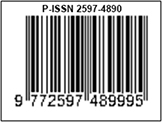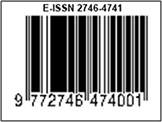URGENSI PROGRAM GERAKAN LITERASI DESA DI INDONESIA
Abstract
This article discusses the urgency and appropriateness of the Village Literacy Movement in Indonesia, addressing various complex challenges related to education levels, resource access, and infrastructure in rural areas. The research aims to examine how literacy programs can enhance the quality of life and economic opportunities for village communities. Using a qualitative exploratory approach, the study finds that low formal education levels, limited access to reading resources, and a shortage of teachers and educational facilities are major barriers to improving rural literacy. Active participation from local government and communities in supporting literacy programs is crucial for their success. Additionally, tailoring literacy programs to local needs and characteristics is considered essential for their effectiveness. Digital literacy and financial literacy are identified as key aspects in the economic empowerment of villages, enabling communities to better utilize technology and manage finances. The findings of this study indicate that village literacy not only aims to improve reading and writing skills but also to empower village communities to access important information that can enhance their quality of life. With improved literacy, village communities are expected to engage more actively in productive and sustainable economic development. Therefore, collaboration between the government, educational institutions, and local communities is vital to creating an environment that comprehensively supports the enhancement of village literacy.
References
Dacholfany, M. I., Azis, A. A., Mardiati, Zulhayana, S., Ahmad, R., Bay, W., & Mokodenseho, S. (2023). Peningkatan Kualitas Pendidikan Masyarakat Melalui Program Pelatihan dan Bimbingan Studi. Easta Journal of Innovative Community Services, Vol.1, No.3, 129-141.Hidayah, L., Widodo, G. S., & Sueb. (2019). Revitalisasi Partisipasi Masyarakat Dalam Gerakan Literasi Nasional: Studi Pada Program Kampung Literasi. Jurnal Bidang Pendidikan Dasar (JBPD), Vol. 3, No.1, 87-98.Johnson, M. J. (2001). Cultural Literacy in Classroom Settings: Teachers and Students Adapt The Core Knowledge Curriculum. Journal of Curriculum and Supervision. Spring, Vol. 16, No.3, 259-272.Mayani, L. A. (2017). Pedoman Penilaian dan Evaluasi Gerakan Literasi Nasional.Jakarta: Kementerian Pendidikan dan Kebudayaan.Mckee, J. (2005). Cultural Literacy and the American Public School. ESSAI, Vol. 3, No. 22.Merriam, S. B., & Tisdell, E. J. (2015). Qualitative Research: A Guide to Design and Implementation.Jossey-Bass.Miftah, Z., Suttrisno, & Rozi, F. (2022). Membangun Desa Melalui Budaya Literasi Desa Ngayung Kecamatan Maduran Kabupaten Lamongan. Reswara: Jurnal Pengabdian Kepada Masyarakat, Vol. 3, No. 2, 392-401.Mumtazah, M. (2023, Desember 5). Pentingnya Pendidikan Anak di Daerah: Menjembatani Kesenjangan Pendidikan. Retrieved from kumparan.com: https://kumparan.com/meisya-tasya/pentingnya-pendidikan-anak-di-daerah-menjembatani-kesenjangan-pendidikan-21h4bQbkMPv
Muttaqin, T. (2018). Determinants of Unequal Access to and Quality of Education in Indonesia. Jurnal Perencanaan Pembangunan, Vol. 2, No.1, 1-23.Nain, U. (2019). Pembangunan Desa Dalam Perspektif Sosiohistoris.Makassar: Garis Khatulistiwa.Nugroho, A. C. (2014). Masyarakat Desa, Internet Dan Peningkatan Ekonomi. Jurnal Studi Komunikasi dan Media, Vol.18, no.2, 151-168.Nurhattati, Matin, Buchdadi, A. D., & Yusuf, C. F. (2020). Teacher Certification in Indonesia: An Education Policy Analysis. Universal Journal of Educational Research, Vol. 8, No. 5, 1719-1730.Pandapotan, S. (2020). Pengembangan Model Kampung Literasi Untuk Meningkatkan Motivasi Pendidikan dan Minat Membaca Masyarakat Desa Kolam Kab. Deli Serdang. Pelita Masyarakat, Vol. 1, No. 2, 315-326.Prasetyo, D. A. (2024, Januari 22). Minat Baca Anak RI Rendah, Waka MPR Singgung Infrastruktur Pendidikan.Retrieved from detik.com: https://news.detik.com/berita/d-7155055/minat-baca-anak-ri-rendah-waka-mpr-singgung-infrastruktur-pendidikanPutnam, R. T., & Borko, H. (2000). What Do New Views of Knowledge and Thinking Have to Say About Research on Teacher Learning? Educational Researcher, Vol. 29, No.1, 4-15.Rahmawati, A., Kurniawan, I., & Artisa, R. A. (2020). Membangun Desa Melalui Budaya Literasi. SeTIA Mengabdi: Jurnal Pengabdian kepada Masyarakat, Vol. 1, No.1, 17-25.Ratmaningsih, N., Logayah, D. S., Afidah, N. N., & Abdulkarim, A. (2019). Literacy Village: A Breakthrough in Creating A Literate. IOP Conference Series Earth and Environmental Science 286, 1-6.
Stebbins, R. A. (2001). Exploratory Research in the Social Sciences.SAGE Publications, Inc.Yulianti, C. (2024, Januari 18). Perpusnas Bakal Salurkan Buku ke 10 Ribu Perpustakaan Desa-Taman Baca. Retrieved from detik.com: https://www.detik.com/edu/edutainment/d-7147816/perpusnas-bakal-salurkan-buku-ke-10-ribu-perpustakaan-desa-taman-baca
Copyright (c) 2024 Caraka Prabu : Jurnal Ilmu Pemerintahan

This work is licensed under a Creative Commons Attribution-NonCommercial 4.0 International License.
Copyright Notice
The Authors submitting a manuscript do so on the understanding that if accepted for publication, copyright of the article shall be assigned to Jurnal Caraka Prabu, Department of Governmental Sciences, Faculty of Social and Political Science, Universitas Jenderal Achmad Yani as publisher of the journal.
Copyright encompasses rights to reproduce and deliver the article in all form and media, including reprints, photographs, microfilms, and any other similar reproductions, as well as translations.
Jurnal Caraka Prabu, Department of Governmental Sciences, Faculty of Social and Political Science, Universitas Jenderal Achmad Yani and the Editors make every effort to ensure that no wrong or misleading data, opinions or statements be published in the journal. In any way, the contents of the articles and advertisements published in Jurnal Caraka Prabu are the sole and exclusive responsibility of their respective authors.



















